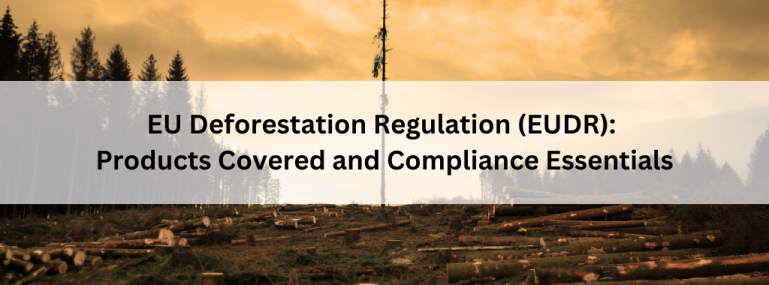The EU Deforestation Regulation (EUDR) is a significant law introduced by the European Union to reduce global deforestation by closely monitoring how products are produced and traded. Its key objectives are to stop products linked to deforestation from being sold in the EU, ensure companies trace the origin of their products and conduct strict due diligence, and improve transparency around environmental and social impacts in global supply chains.
The regulation was initially scheduled to take effect on December 30, 2024, but has now been postponed by one year. It will be enforced for large companies starting December 30, 2025, while small and medium-sized enterprises (SMEs) will be required to comply beginning June 30, 2026. This phased approach gives businesses additional time to prepare for compliance and strengthen their supply chain due diligence processes.
EUDR contributes to global environmental protection by holding companies accountable for their sourcing practices. By ensuring that products entering the EU market are not linked to deforestation or forest degradation, the regulation sets a global benchmark for responsible trade. One of its major environmental benefits is reducing greenhouse gas emissions by cutting carbon released from deforestation-related activities, with an estimated reduction of at least 32 million metric tonnes per year. Additionally, EUDR helps preserve biodiversity and safeguards forest ecosystems, while also promoting sustainable agricultural practices by addressing deforestation caused by the production of high-impact commodities such as cattle, soy, palm oil, coffee, cocoa, rubber, and wood.
To ensure compliance, the regulation requires companies to conduct thorough checks, including verifying geolocation data of sourced goods and confirming that these products meet legal production standards. While EUDR is an EU regulation, its influence is global, as businesses in exporting countries like India must also comply if they wish to access the EU market. This makes EUDR not just a European requirement but a worldwide trade standard that impacts supply chains across continents.
The regulation applies to certain raw materials and products closely linked to deforestation and forest degradation, as listed in Annex I of the law. These products are classified using Combined Nomenclature (CN) codes, which are essential for determining trade compliance. Covered products include everyday goods such as wooden furniture and flooring, cocoa and chocolate products, coffee beans and ground coffee, leather goods including footwear and bags, rubber-based products such as tires and gloves, soy derivatives including animal feed and cooking oils, and palm oil, widely used in cosmetics and biofuels. However, some processed or multi-ingredient products may be excluded if their primary classification under CN codes does not fall within the regulated categories, even if they contain one of the listed raw materials. For this reason, it is crucial for businesses to carefully review the CN codes of their products to determine whether EUDR applies, ensuring compliance and avoiding trade disruptions with the EU.
ComplianceXL provides specialized EUDR consulting services, helping companies navigate these complex regulatory requirements. Our services include managing supplier certificates and declarations on a regular basis as part of a robust compliance data management strategy, ensuring businesses remain fully prepared for EU regulatory checks.
FAQs:
1. Who needs to comply with EUDR?
Operators, Traders, and SMEs are required to comply with the regulation.
2. Does it apply outside of the EU?
Yes, producers in countries like India must comply if their products are exported to the EU.





